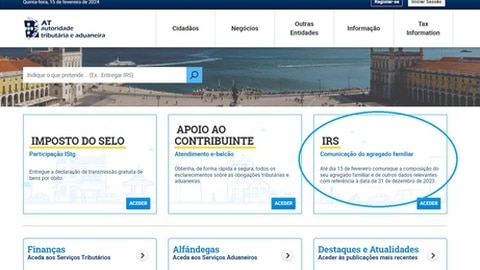The deadline for taxpayers to inform the IRS about the composition of their household at the end of 2023 ends today, and this is the information that the tax authorities will take into account in the IRS tax return to be filed this year.
Updating information on the household is especially important for families that in 2023 had changes in their composition, for example, as a result of births, divorce, a change in the parental agreement, the death of one of the couple members or a change of permanent residence.
Without this updated information, the Tax and Customs Authority (AT) will take it into account and make the calculations for the purposes of IRS deductions, based on the personal and family information contained in the IRS tax return filed last year.
The household can be updated via the Finance Portal, and this is also the time to indicate situations in which children are over the age at which they are no longer considered dependents for IRS purposes – even if they continue to live with their parents.
The communication of the household must also be complied with by parents with dependents in joint custody and a Parental Responsibility Regulation Agreement that determines the alternating residence regime, as well as the percentage of sharing of expenses by each of the guardians when it is not equal.
This step must be taken by both parents and the information on dependents must match, because if it doesn’t, the tax authorities will split the expenses in half.
“If this communication is not made on time, or if it is, it is not consistent with the communication made by the other household regarding the same dependent in joint custody, this dependent is considered not to have alternate residence and the percentage of sharing of expenses of the respective parents is divided equally,” according to the information available on the Finance Portal.
The validation of the household also allows taxpayers to benefit from the automatic IRS (if they meet the income profile required for this) and allows the AT to make the necessary calculations so that people who are exempt from submitting an IRS tax return can obtain and benefit from exemption from user charges in the National Health Service, the social electricity tariff or social support, for example.
This step should be followed even by those who have not registered any changes in the household, as this is the only way to ensure that it is possible to access (should the need arise) updated proof of household composition, which may be necessary, for example, to renew the family pass or to enroll in public schools.
Today also sees the end of the deadline for reporting education expenses for attending an educational establishment located inland or in an autonomous region – a situation in which these deductions are increased – as well as rental expenses for transferring permanent residence to the interior of the country.









